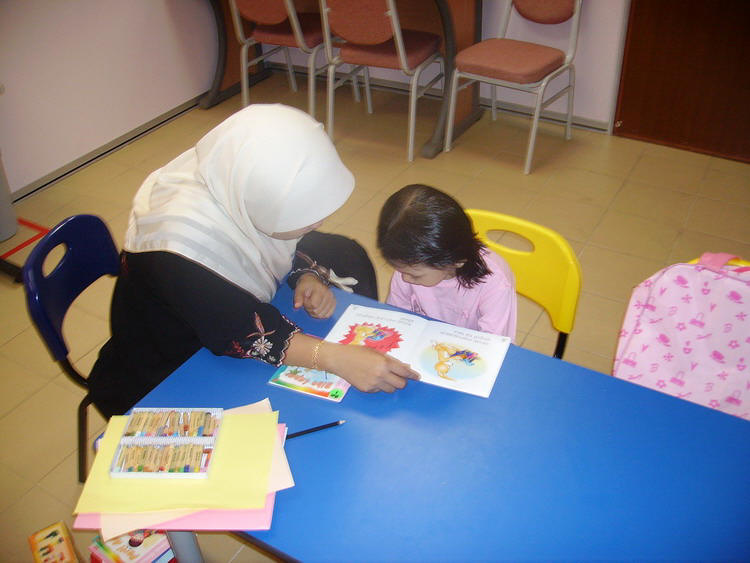‘Autism’ derives from the Greek word ‘Autos’ means ‘self’. In this context, it refers to child in his/ her own world. Autism is associated with communication difficulties, behavioral issues and limited interest to objects/ things, which lead to social interaction impairment.
Characteristics of Children with Autism
Autism can be detected as early as 18 months old. Autism causes delay in the following aspects:
-
Speech, language and communication skills
Children with autism have difficulty to understand spoken language, talking and expressing needs. Their speech might be limited to one word utterances. Some of them only produced unintelligible speech or jargon. Verbal children with autism are often present with echolalia which is repeating whatever words s/he hears.
-
Social interaction skill
Main characteristic of children with autism is their poor interest to interact with other people. They present with poor respond to call, lack of eye contact, like to play alone and difficult to mix around with other people or peers.
-
Behaviour and emotion
Self-injurious behaviours such as head-banging and hand-biting are common among children with autism. Some of them are also present with unnecessary behavior such as hand-flipping and constantly running back and forth or jumping. Emotional regulation problem is also common among them. They can cry, shout and laugh with no reason.
-
Sensory and physical touch
Some children with autism are sensitive towards loud noise, touch and taste. They might also have licking, mouth-watering and biting behaviours. Most of them usually refuse to be touched, held, or hugged. They might also refuse certain foods due to sensory issue.
-
Cognitive
Children with autism are often present with delay in cognitive development as compared to their normal developing peers. Most of them have Intelligence Quotient (IQ) which is lower than normal developing children of the same-aged. This leads to children of autism having difficulty to understand abstract concepts such as emotion and danger.
-
Playing skill
Children with autism have difficulty to understand the play concept accordingly. They often throw things and put them in the mouth. They have restricted interest to toys and always play with the same toy over and over again.
Autism Management
Children with autism need multi-disciplinary management or therapy from professionals from different specialty. This is important to help them to improve in overall development.
Therapy helps children with autism to learn necessary skills for them to help themselves in daily living, to learn and to communicate with others. Speech-Language Therapy and Occupational Therapy are among the most important therapy for children with autism.
 |
| Source: http://jppp.hukm.ukm.my |
Speech-Language Therapy
Speech-Language Therapy is conducted by a Medical Rehabilitation Officer (Speech) or Speech-Language Therapist. Speech-Language Therapy is important to improve speech, language and communication skills among children with autism. The main goal of this therapy is to optimize functional communication of children with autism.
Speech-language therapy for children with autism focuses on the following subjects:
- Assessment of speech, language and communication skills
- Treatment of speech, language and communication skills
- Augmentative and Alternative Communication (AAC)
Assessment of speech, language and communication skills
Assessment is done to identify the child’s speech, language and communication level. Based on assessment findings, Speech-Language Therapist will make a diagnosis of child’s speech, language and communication skills, and discuss with parents regarding treatment targets and planning.
Treatment of speech, language and communication skills
Therapy will be conducted based on treatment aims that has been discussed with parents / caretaker. Treatment aims that are important for children with autism are :
- To improve early communication skills
- To improve receptive and expressive language skills
- To improve playing skills
Augmentative and Alternative Communication (AAC)
Most of the children with autism need Augmentative and Alternative Communication (AAC) to help them to express themselves. AAC helps children with autism that cannot talk or have limited expressive language. Example of AAC system that can be used by therapist to help children with autism to communicate is Picture Exchange Communication System (PECS).
Conclusion
In conclusion, speech-language therapy is given to children with autism to help them to develop necessary skills that are important to communicate with others. This will also help to reduce autism characteristics. Children with autism of mild severity have the potential to develop normally if they received multi-disciplinary treatment as early as two (2) to three (3) years old. On the other hand, children with autism of moderate to severe level are usually having difficulty to develop normally.
References
- Bee, H. & Boyd, D. (2004). The Developing Child. (10th Ed.). Boston: Pearson.
- Gardner, J., Grant, J. & Webb, P. (2001). Autism for All Teachers. WA: KLIK Enterprises.
- Janzen, J.E. (1996). Understanding the Nature of Autism. A Practical Guide. Texas: Therapy Skill Builders.
- Paul, R. (2001). Language Disorders from Infancy through Adolescence. (2nd Ed.) USA: Mosby.
- http://www.youtube.com/watch?v=_ZxlmgVtNws
- http://www.youtube.com/watch?v=UF8iOAK3CLM
- http://www.youtube.com/watch?v=fe2HD7Ji4gQ
- http://www.youtube.com/watch?v=uqaiAyMSaEo
| Last Reviewed | : | 28 August 2020 |
| Writer / Translator | : | Rozila bt. Sumardi |
| Accreditor | : | Zaidi bin Ya’acob |
| Reviewer | : | Nadwah bt. Onwi |







